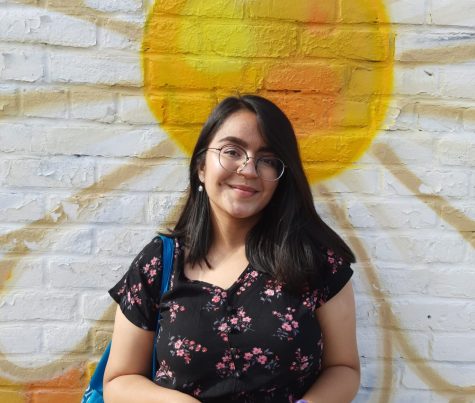Introducing the ‘Blackness Uncensored’ series: embodying Black excellence
[from left to right] Jordanella Maluka, Michelle Osiro and Gabby Whitehurst. Photo courtesy of Milkee Bekele
March 30, 2023
The acceptance of Black excellence in higher education institutions like Macalester is always conditional on its visibility instead of its everyday embodiments. This Spring, Opinion Editor Milkee Bekele and Features Editor Dipakshi Sarma conversed at length on presenting Black excellence that has continued and will continue to exist within the fabrics of this college. This culminated in the ‘Blackness Uncensored’ series to showcase Black students who have defined what it means to be Black and excellent.
The first edition of the ‘Blackness Uncensored’ series is called ‘Black excellence’ featuring Jordanella Maluka ’23, Michelle Osiro ’24 and Gabby Whitehurst’23 who all embody Black excellence through their presence in Black community-building spaces.
Their uplifting presence throughout campus exhibits themes of Black student empowerment, cultivation of sustainable community-building and the exploration of radical joy and expression. The ongoing work that Maluka, Whitehurst and Osiro have conducted toward finding what Black excellence means to them is one that acts in defiance and liberation for Black studenthood.
Jordanella Maluka ’23 has created tides in enhancing the inclusion of students from marginalized communities at Macalester. As the vice president of the Macalester College Student Government from 2021-22 and later the president in 2022, she utilized her platform to cultivate a community in which students not involved in student government felt comfortable sharing their opinions as much as others.
“When I have a strong sense of purpose I [can say that] I’ve experienced joy throughout. That means even if my whole life is falling down around me, I have something that grounds me,” Maluka said.
“For a long time during my sophomore year and junior year, I spent a lot of time being the only student voice in trying to advocate for our school to open up to Black students in the United States. So, I worked with a lot of … Black alumni who are really passionate about changing the numbers,” Maluka said.
As a junior, Michelle Osiro ’24 successfully hosted an international roundtable panel in October 2022, alongside Chevonne Kwarisiima ’24 entitled “Content Creation as Decolonisation: An African Perspective”. Throughout her time as an international African student at Macalester, Osiro has carved out what it means to exist within her Blackness and Africanness through self-definition in large and small-scale practices.
“Showing up on the Macalester campus and the experiences I bring, as a Black student and an African student specifically, how do I find myself within that?” she recalled. “Sometimes I feel that I have the need to deliberately take up that space with my own initiative, rather than it being provided to me.”
Gabby Whitehurst ’23 previously worked in the Black Liberations Affairs Committee (B.L.A.C.) in different capacities, most notably as its vice president during the 2020-2021 academic year. Outside the scope of B.L.A.C, Whitehurst has been active in cultivating other BIPOC community-building spaces to explore Blackness and self-expression.
“I definitely like to uplift people’s creativity; it’s showing interest in other people’s stuff. And then, independently, I’ve tried to just create more spaces on campus just for students of color, particularly artists of color, and queer students of color to be able to be together.”
Maluka also pointed out the importance of feeling valued by her Black community around her and reciprocating that intentional care.
“I have a responsibility to do what I can with what I have … I can’t just sit and watch that, I need to do something about that,” she said. “I think that comes from a lot of inspiration from people. Before me a lot of these Black amazing leaders in this country and around the world.”
Moreover, while focusing on Macalester’s Black community’s daily forms of resistance to structural discrimination, the ‘Blackness Uncensored’ series intends to celebrate radical joy. As an intentional practice of embodying joy in the wins along the way, radical joy is an important aspect of Black excellence.
Underscoring joy as a radical part of their Blackness, Whitehurst adds the role stability plays in embodying this joy.
“I think sometimes places will wear you down so much that you just completely give up on things like making things right, fair. But nothing here is right or fair. And you should feel angry about that. Balance and stability feel quite radical to me. Joy to me is just like stability.”
Whitehurst discusses how they hope to create avenues by which other Black students can explore their radical joy while carrying that with them to build communal practices of care, accountability and sustainability.
“I recognize that there are certain things that you owe to the people around you, everyone owes something to somebody, like, hello, you actually have to contribute to the community that you’re a part of because it helps to sustain you.”
Maluka situates her radical joy in self-searching and serving the communities she engages with.
“I love searching and learning about myself and the roots and all of the different factors that have formed me to become the person that I am today,” she remarked. “I find a lot of radical joy through music. I think it’s so powerful that it also has a strong sense of community and expression of art is a strong sense of radical joy in the Black community.”
Echoing Maluka’s response, Osiro noted the simple joys of spending intentional time and space with other Black folks.
“Joy is spending time with the people I love, people who affirm me and people who I can affirm as well,” Osiro explained. “I like seeing Black people happy, because it reminds me that I can also be happy. Representation-wise, whether that’s like the media I consume, the people I am around, I like being around happy Black people.”
Students like Maluka, Whitehurst and Osiro are cultivating and self-identifying in Black student excellence. They recognize the individual and social aspects of this, applauding the work of those who came before them.
Within community-building responsibilities, Whitehurst celebrates their Black ancestry in the identification of their Black studenthood as a symbol for liberation and Black excellence. This celebration is both for themselves and their community.
“Education and Blackness is something that’s very important to me. And obviously, it’s something that has been and is currently denied to Black Americans, whether that be literacy bans, to just underfunded, understaffed schools. So for one, Frederick Douglass: ‘education is liberation’,” they noted.
“To me, being a Black student, I see [education] sort of as a responsibility that I owe to my people because I had the opportunity to get one,” they continued.
Black students have broken the conventions of Black excellence by consistently showing up and affirming the multifaceted ways that Black studenthood exists at Macalester.
“For me, it has been really taking up space, taking up space and not being ashamed of doing it. And also realizing that just because I don’t see people like myself doing it doesn’t mean that I can’t do it, or shouldn’t do it,” Maluka remarked.
Black studenthood itself transcends institutionalization that often puts the burden of becoming activists, students, educators and many more roles on the shoulders of minoritized Black students. However, Black student excellence is cultivated individually while simultaneously celebrating and learning from a larger Black community.
“I like being Black, because I’m very proud to be Black. I’m proud of just where I come from. My people, my family have been able to overcome and build,” Whitehurst affirmed. “It’s miraculous to me actually. The things that we have been able to do here considering what we have been given. I think it’s quite beautiful and miraculous,” they continued.
The self-identification of Black excellence has provided Maluka, Osiro and Whitehurst the capabilities to construct and exist within their own realm of Black excellence. Blackness is excellence. Black excellence exists and flourishes every day at Macalester, and does not require the recognition of higher education institutions to be exercised.
“Black excellence doesn’t always mean being the 1%. That’s not what it should be. It should be being content with where you are, and knowing that you’re okay, doing the best that you can. It doesn’t always have to be like extraordinary, amazing, capitalist-centric things. It’s also just simply being happy,” Osiro concludes.

![[from left to right] Jordanella Maluka, Michelle Osiro and Gabby Whitehurst. Photo courtesy of Milkee Bekele](https://themacweekly.com/wp-content/uploads/2023/03/Screen-Shot-2023-03-30-at-8.18.00-PM-900x396.png)














Jordanella Maluka • Mar 31, 2023 at 7:06 pm
Thank you so much to Milkee and Dipakshi for this beautiful article and for your incredible work in acknowledging Black students and our impact on this campus!
Kamini Ramakrishna • Mar 31, 2023 at 10:20 am
Absolutely fantastic!! This is the kind of content that The Mac Weekly should be publishing regularly.